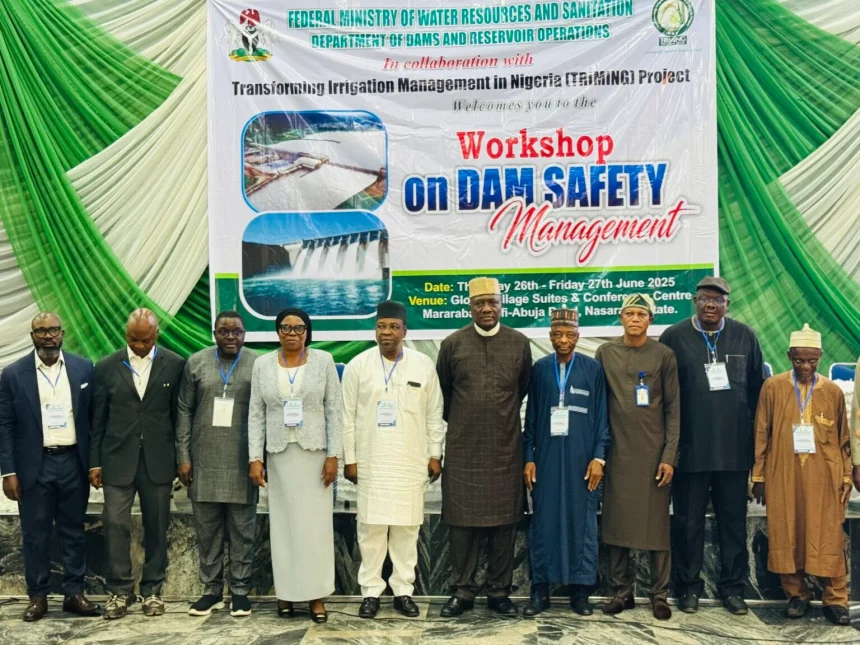He said the government remained resolute in strengthening dam infrastructure to support irrigation, potable water supply, hydropower, and flood management.
“Dams are critical national assets, but they also present significant risks if not properly managed. Ensuring their safety is vital for protecting lives, livelihoods and property, and is also central to achieving the objectives of the SPIN Project,” he said.
He noted that the ministry was working closely with development partners to incorporate best practices in dam management, including early warning systems, emergency preparedness, and climate adaptation strategies.
According to him, the workshop provides a platform for knowledge sharing, technical learning, and collaboration among key actors in dam operations across the country.
He reaffirmed the ministry’s commitment to ensuring that dams nationwide operate in accordance with the highest safety standards, adding that all owners must be guided by established safety frameworks.
Pheelangwah commended the World Bank, the TRIMING Project Management Team, and the organising committee for their support in convening the workshop.
He encouraged participants to engage actively and apply the lessons learned to improve dam safety management at all levels.
In his remarks, Dr Martins Eduvie, Acting Director-General of the National Water Resources Institute (NWRI), Kaduna, called for stronger institutional mechanisms to safeguard Nigeria’s more than 420 registered dams.
Eduvie stressed that although many dams serve crucial purposes such as water supply, irrigation, flood control, and energy generation, their management is sometimes underplayed.
He cited the recent incident in Mokwa, Niger, as a reminder of the consequences of poor infrastructure oversight.
According to him, the blockage of railway drainage channels by debris resulted in an unplanned impoundment of water, which led to destructive flooding when the water finally breached the obstruction.
He likened the Department of Dams to a regulatory watchdog, stating that it should operate with the same rigour as anti-corruption agencies.
“With more than 420 dams in the country, the Department of Dams should serve as the EFCC of dam safety. All dams must be properly registered, routinely inspected, and certified with valid safety permits,” he said.
Eduvie also commended efforts to adopt safety standards approved by the Standards Organisation of Nigeria, stating that such measures would enhance the country’s dam management framework.
“Dam safety goes beyond technical concerns; it is a national priority. We must treat it as such in our daily planning and operations,” he said.
Earlier, Mr Ali Dallah, Director of Dams and Reservoir Operations in the ministry, said the safety of Nigeria’s dams must not be taken lightly, considering the role they play in supporting food production, water access, electricity, and flood control.
He noted that many of the country’s dams are ageing and face growing threats from climate change, catchment degradation, and unregulated urban development.
“This workshop is both timely and strategic. It allows us to assess our current position and chart a clear path towards establishing a sustainable dam safety culture,” Dallah said.
He added that the ministry was working to finalise a National Dam Safety Management Framework and review technical guidelines in alignment with international best practices, including those set by the International Commission on Large Dams (ICOLD).
In his lead paper presentation, Mr Alabi Daisi called for the integration of host communities into dam safety efforts, noting that their local knowledge and proximity to dam structures make them valuable early-warning actors.
Daisi underscored the importance of educating communities on how to identify and report signs of distress around dam infrastructure.
He also advocated for stronger enforcement of regulations, saying unapproved construction of dams and irrigation systems still happen in some parts of the country.
He stated that all dam owners should maintain structured safety management systems that address routine operations, maintenance, and emergency response.
Highlighting the development of a national risk index tool, Daisi noted that future rehabilitation efforts must be based on risk severity, not political considerations.
He warned that unless root causes of structural issues are addressed, interventions would remain superficial.
The workshop featured technical sessions on inspection protocols, emergency planning, safety assessments, and the use of digital tools for dam monitoring.
Participants included engineers, hydrologists, disaster risk experts, state officials, and representatives of development agencies working in the water and energy sectors.



